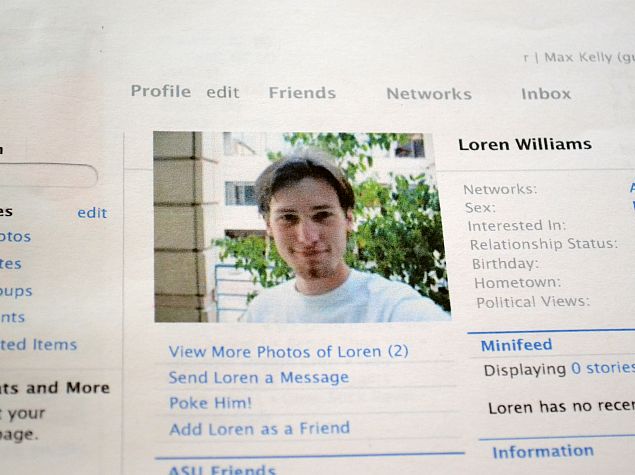- Home
- Internet
- Internet News
- New Bill to Ensure Email, Other Online Content Won't Die With Person
New Bill to Ensure Email, Other Online Content Won't Die With Person

A group of influential U.S. lawyers says it has an answer to the question of what should happen to Facebook, Yahoo, Gmail and other online accounts when a person dies.
The Uniform Law Commission, whose members are appointed by state governments to help standardize state laws, on Wednesday endorsed a plan that would give loved ones access to - but not control of - the deceased's digital accounts, unless specified otherwise in a will.
To become law in a state, the legislation would have to be adopted by the legislature. If it did, a person's online life could become as much a part of estate planning as deciding what to do with physical possessions.
"This is something most people don't think of until they are faced with it. They have no idea what is about to be lost," said Karen Williams, who sued Facebook for access to her 22-year-old son Loren's account after he died in a 2005 motorcycle accident.
The question of what to do with one's "digital assets" is as big as America's electronic footprint. A person's online musings, photos and videos can be worth considerable value to an estate. Imagine the trove of digital files for someone of historical or popular note and what those files might get at auction.
"Our email accounts are our filing cabinets these days," said Suzanne Brown Walsh, a Cummings & Lockwood attorney who chaired the drafting committee on the proposed legislation. But "if you need access to an email account, in most states you wouldn't get it."
But privacy activists are skeptical of the proposal. Ginger McCall, associate director of the Electronic Privacy Information Center in Washington, said a judge's approval should be needed for access, to protect the privacy of both the owners of accounts and the people who communicate with them.
(Also See: Microsoft Starts Taking EU 'Right To Be Forgotten' Requests)
"The digital world is a different world" from offline, McCall said. "No one would keep 10 years of every communication they ever had with dozens or even hundreds of other people under their bed."
Many people assume they can decide what happens by sharing certain passwords with a trusted family member, or even making those passwords part of their will. But anti-hacking laws and most companies' "terms of service" agreements prohibit anyone from accessing an account that isn't theirs. That means loved ones technically are prohibited from logging onto a dead person's account.
Several tech providers have come up with their own solutions. Facebook, for example, will "memorialize" accounts by allowing already confirmed friends to continue to view photos and old posts. Google, which runs Gmail, YouTube and Picasa Web Albums, offers its own version: If people don't log on after a while, their accounts can be deleted or shared with a designated person. Yahoo users agree when signing up that their accounts expire when they do.
According to the Uniform Law Commission proposal, the personal representative of the deceased, such as the executor of a will, would get access to - but not control of - a person's digital files so long as the deceased didn't prohibit it in the will. The law would trump access rules outlined by a company's terms of service agreement, although the representative would still have to abide by other rules including copyright laws.
That means, for example, a widow could read her deceased husband's emails but couldn't send emails from that account.
Williams said she supports letting people decide in their wills whether accounts should be kept from family members.
"I could understand where some people don't want to share everything," she said in a phone interview this week. "But to us, losing him (our son) unexpectedly, anything he touched became so valuable to us."
Catch the latest from the Consumer Electronics Show on Gadgets 360, at our CES 2026 hub.
Related Stories
- Samsung Galaxy Unpacked 2025
- ChatGPT
- Redmi Note 14 Pro+
- iPhone 16
- Apple Vision Pro
- Oneplus 12
- OnePlus Nord CE 3 Lite 5G
- iPhone 13
- Xiaomi 14 Pro
- Oppo Find N3
- Tecno Spark Go (2023)
- Realme V30
- Best Phones Under 25000
- Samsung Galaxy S24 Series
- Cryptocurrency
- iQoo 12
- Samsung Galaxy S24 Ultra
- Giottus
- Samsung Galaxy Z Flip 5
- Apple 'Scary Fast'
- Housefull 5
- GoPro Hero 12 Black Review
- Invincible Season 2
- JioGlass
- HD Ready TV
- Laptop Under 50000
- Smartwatch Under 10000
- Latest Mobile Phones
- Compare Phones
- iQOO Z11 Turbo
- OPPO A6c
- Samsung Galaxy A07 5G
- Vivo Y500i
- OnePlus Turbo 6V
- OnePlus Turbo 6
- Itel Zeno 20 Max
- OPPO Reno 15 Pro Mini 5G
- Lenovo Yoga Slim 7x (2025)
- Lenovo Yoga Slim 7a
- Realme Pad 3
- OPPO Pad Air 5
- Garmin Quatix 8 Pro
- NoiseFit Pro 6R
- Haier H5E Series
- Acerpure Nitro Z Series 100-inch QLED TV
- Asus ROG Ally
- Nintendo Switch Lite
- Haier 1.6 Ton 5 Star Inverter Split AC (HSU19G-MZAID5BN-INV)
- Haier 1.6 Ton 5 Star Inverter Split AC (HSU19G-MZAIM5BN-INV)

















